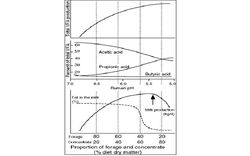Difference between revisions of "Volatile Fatty Acids"
| (One intermediate revision by one other user not shown) | |||
| Line 2: | Line 2: | ||
==Introduction== | ==Introduction== | ||
| − | Microbes in the rumen ferment carbohydrates into volatile fatty acids which are absorbed through the [[Rumen - Anatomy & Physiology|rumen]] wall into the blood stream. Some of the volatile fatty acids are lost during [[Eructation | + | Microbes in the rumen ferment carbohydrates into volatile fatty acids which are absorbed through the [[Rumen - Anatomy & Physiology|rumen]] wall into the blood stream. Some of the volatile fatty acids are lost during [[Eructation|eructation]]. |
Volatile fatty acids are the main energy source for ruminants, providing approximately 70% of the total energy requirements. They are used primarily by the microorganisms for reproduction and growth, with the excess production being used by the ruminant itself. | Volatile fatty acids are the main energy source for ruminants, providing approximately 70% of the total energy requirements. They are used primarily by the microorganisms for reproduction and growth, with the excess production being used by the ruminant itself. | ||
| Line 31: | Line 31: | ||
}} | }} | ||
| − | + | ==Webinars== | |
| + | <rss max="10" highlight="obesity nutrition eat">https://www.thewebinarvet.com/gastroenterology-and-nutrition/webinars/feed</rss> | ||
[[Category:Stomach - Anatomy & Physiology]] | [[Category:Stomach - Anatomy & Physiology]] | ||
[[Category:A&P Done]] | [[Category:A&P Done]] | ||
Latest revision as of 19:36, 27 October 2022
Introduction
Microbes in the rumen ferment carbohydrates into volatile fatty acids which are absorbed through the rumen wall into the blood stream. Some of the volatile fatty acids are lost during eructation.
Volatile fatty acids are the main energy source for ruminants, providing approximately 70% of the total energy requirements. They are used primarily by the microorganisms for reproduction and growth, with the excess production being used by the ruminant itself.
The three main volatile fatty acids produced in ruminants are acetic acid, butyric acid and propanoic acid.
Acetic acid
50-60% of VFAs produced is acetic acid. It predominates on a high roughage diet and is a precursor for mammalian milk fat. Some is also used for muscle metabolism and body fat. The molecular formula is, CH3.COOH.
Propanoic Acid
12-18% of VFAs produced is propanoic acid. It predominates on a high concentrate diet and provides energy via the conversion of blood glucose in the liver. It is used in lactose (milk sugar) synthesis. The molecular formula is, CH3.CH2.COOH.
Butyric Acid
18-20% of VFAs produced is butyric acid. It provides energy to the rumen wall and is used in milk fat synthesis and for body fat, when excess energy is present in the diet. It doesn't vary in proportion to other volatile fatty acids, therefore has little influence in milk fat content. The molecular formula is, CH3.CH2.CH2.COOH.
Links
Click here for more information on acidosis.
| Volatile Fatty Acids Learning Resources | |
|---|---|
 Test your knowledge using flashcard type questions |
Rumen Flashcards |
Webinars
Failed to load RSS feed from https://www.thewebinarvet.com/gastroenterology-and-nutrition/webinars/feed: Error parsing XML for RSS
